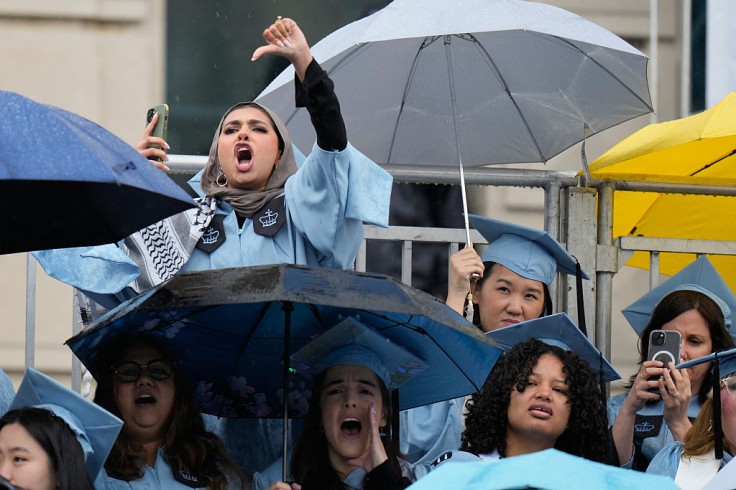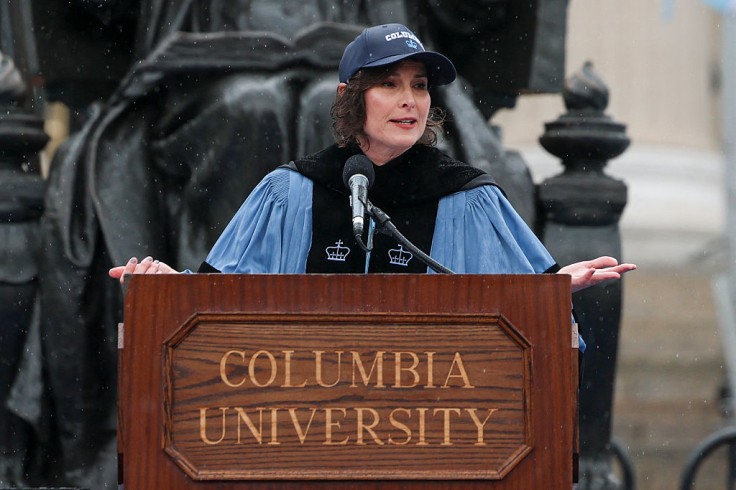

NEW YORK — Columbia University's commencement ceremony on Wednesday was overshadowed by loud boos and chants of "free Palestine" as Acting President Claire Shipman addressed the absence of graduate student Mahmoud Khalil, a Palestinian activist detained in a Louisiana jail facing deportation. The protests reflect growing tensions over free speech and the Trump administration's crackdown on pro-Palestinian campus activism.
Shipman, who took over as acting president in late March, acknowledged Khalil's absence during her speech on Columbia's main campus in Manhattan. "We firmly believe that our international students have the same rights to freedom of speech as everyone else and they should not be targeted by the government for exercising this right," Shipman said, adding: "I know many in our community are mourning the absence of our graduate Mahmoud Khalil."
Khalil, a graduate student in Columbia's international affairs program, was arrested by federal immigration agents on March 8, 2025, at his off-campus apartment in Manhattan. He has been held at the LaSalle Detention Center in Jena, Louisiana, and faces deportation for his prominent role in pro-Palestinian protests at Columbia last spring. Federal authorities have not charged Khalil with a crime but argue his activism undermines U.S. foreign policy interests, citing his alleged support for Hamas, a claim Khalil and his attorneys deny.
The commencement, held under rainy skies, saw some students walk out while others booed and jeered during Shipman's remarks. The acting president faced a similar reception at a smaller graduation ceremony on Tuesday, reflecting the deep divisions on campus over the Israel-Hamas conflict and Khalil's detention.
Khalil's arrest marks the first publicly known deportation effort under President Donald Trump's pledge to target student activists involved in pro-Palestinian demonstrations. The administration has labeled such protests as antisemitic and supportive of Hamas, a designated terrorist organization. Khalil's attorneys argue his detention is a violation of his First Amendment rights, accusing the government of targeting him to suppress dissent.
"Mahmoud's detention is indicative of the anti-Palestinian racism that both the Biden and Trump administrations have demonstrated," Khalil wrote in a letter from detention, released by his attorney. He has also been unable to see his newborn child, born during his detention, as jail authorities have rejected his requests to hold the infant.
Protests in support of Khalil have spread beyond Columbia, with demonstrations at UC Berkeley and a sit-in at Trump Tower organized by Jewish Voice for Peace, where nearly 100 protesters were arrested. Jewish groups, including J Street and IfNotNow, have condemned Khalil's detention, arguing it represents an authoritarian overreach by the Trump administration.
Columbia University has faced additional pressure from the White House, which has accused the school of refusing to help federal agents identify other pro-Palestinian activists. The Trump administration has also threatened to cut $400 million in federal funding unless Columbia places its Middle Eastern, South Asian, and African Studies Department under "academic receivership" for five years, a demand critics call an attack on academic freedom.
Khalil's legal team is appealing a Louisiana immigration judge's April 11 ruling that he can be deported as a national security risk. A federal judge in New Jersey has temporarily barred his removal while the case continues. The appeal process could extend for months, with Khalil's attorneys also exploring an asylum claim.
As Columbia grapples with these tensions, the university remains a flashpoint in the broader national debate over protest rights and U.S. policy toward Israel and Palestine.
© 2026 University Herald, All rights reserved. Do not reproduce without permission.








